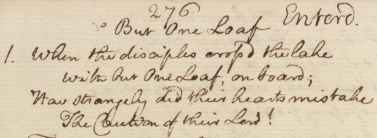|
Olney Hymns Book 1 Hymn 94
When the disciples crossed the lake...
Manuscript Hymn No. 276

MARK
Chapter 8:14
But one Loaf (a)
When the disciples crossed the lake
With but one loaf on board,
How strangely did their hearts mistake
The caution of their Lord.
“The leaven of the Pharisees
Beware,” the Saviour said;
They thought, it is because he sees
We have forgotten bread.
It seems they had forgotten too
What their own eyes had viewed;
How with what scarce sufficed for few,
He fed a multitude.
If five small loaves, by his command,
Could many thousands serve;
Might they not trust his gracious hand,
That they should never starve?
They oft his power and love had known,
And doubtless were to blame;
But we have reason good to own
That we are just the same.
How often has he brought relief,
And every want supplied!
Yet soon, again, our unbelief
Says, “Can the Lord provide?”
Be thankful for one loaf today,
Though that be all your store;
Tomorrow, if you trust and pray,
Shall timely bring you more.
(a) See also Book 3, Hymn 57
 |
|
from John Newton's Diary, relevant to this hymn:
Monday 9 June 1777
A walk with Lord Dartmouth before breakfast, was the best part of this day. Afterwards the town full of company. I dined with Lord Dartmouth, Lord Verney and a number of gentlemen at the Swan, on a committee about the bridge. We had an elegant dinner, and when over, my Lord left us, and went to Chichley [the nearby home of Lord Dartmouth’s cousin] from whence he goes tomorrow to Mr Barham's. Do thou gracious Lord go with him, and do him good in every place, and make him an instrument of good to many. In the evening walked with my dear to the Mill.
Tuesday 10 June 1777
Little to record – a sort of confusion and indolence upon my mind. I have much to do, but seem not to know how or where to begin.
Thursday 12 June 1777
Time runs away – it flies – the days and weeks pass and come round like minutes. And time, by me, is poorly improved. I seem more unskilful and indolent in redeeming it than ever. Last night some conversation with Jones, in consequence of what passed between me and Mr B when on the road from Bedford.
Met the children this morning, and in the evening preached. Made a hymn in the forenoon, visiting the people in the afternoon. [lecture:] Psalm 40:1 [I waited patiently for the Lord; and he inclined unto me, and heard my cry.]
Saturday 14 June 1777
Can record but little of the days as they go. Indeed I do but little: attention to the sick, to my Dear, who must walk if possible daily, to Orchard Side etc, together with a sad indolence, which I complain of but cannot shake off – straighten me, that I seem a mere trifler. What is worse, I hardly find time for reading Scripture, and am, Oh how unskilful, backward and formal in prayer. Lord thou knowest me, and thou bearest with me. Thy patience and grace are wonderful. O quicken and strengthen me, and let not my desire of living to thee and for thee, prove like the desire of the sluggard. A walk in the evening. Part of it a pleasant walk. Every minute in which my heart can get near to thee, is precious.
Sunday 15 June 1777
How cold and wandering was my heart in the morning! How distracted were my attempts to pray! Alas! How vile a creature, but it is given me to believe in thy Name, and therefore though cast down I am not destroyed, though unworthy I am still helped. I thank thee for a time of much liberty in the forenoon, and that I was not left destitute any part of the day. In the afternoon spoke on the prevalent abuses in the town, which makes us a reproach and a byword.
Psalm 63:1 [O God, thou art my God; early will I seek thee: my soul thirsteth for thee, my flesh longeth for thee in a dry and thirsty land, where no water is]
Proverbs 14:9
Hymn No. 276
[On this date Newton preached from the above texts at his church, St Peter & St Paul, Olney, during the morning and afternoon services, and from this hymn at the informal evening service] |
Image copyright:
Hymn: MS Eng 1317, Houghton Library, Harvard University
Diary: John Newton Collection, CO199, Princeton University
|
Marylynn Rouse, 10/09/2013
|
|
|
|